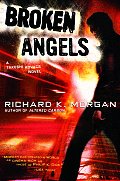
| Series: | Takeshi Kovacs #2 |
| Publisher: | Del Rey |
| Copyright: | 2003 |
| Printing: | March 2004 |
| ISBN: | 0-345-45771-4 |
| Format: | Trade paperback |
| Pages: | 366 |
This is the second of Morgan's novels about the cynical ex-Envoy Takeshi Kovacs, following Altered Carbon, but it takes place some thirty years later and is quite readable on its own. The only references to the previous book are elliptical and the sleeve technology underlying the plot is explained in a brief introductory note. (I much prefer that technique to an intrusive explanation in the book itself.)
Like Altered Carbon, Broken Angels is a violent, angry, cynical story that features a great deal of gunfire and gore. Unlike Altered Carbon, Morgan moves away from the noir detective genre and more firmly into thriller, although something of a mystery remains. The opening of the novel finds Kovacs working as a mercenary, recovering from being wounded and accepting an offer from a sleazy corporate executive and rogue pilot to spring an archeologue (Martian archeologist, basically) from a prison camp on the war-torn planet he's serving on and go after a prize bigger than the war: an intact Martian spacecraft and an instantaneous travel gate. The Martians, in this universe, are apparently extinct but left behind the renmants of a star-faring civilization and various toys that humans have so far failed to make much sense of, but nothing like this has been found before.
Kovacs and the corporate exec put together a mercenary team from personality cores saved from killed soldiers. In this world, the technology of capture of human minds has been perfected and everyone wears a personal "black box" at the top of their spine that records their personality and memories. Bodies are only "sleeves," replaced (if one has the resources) when they die provided that the box is intact. Altered Carbon explores the politics and social impact of sleeve technology in greater depth; here, it's just world background, a way of making some deaths worse than others in a military setting where people die constantly, and a way to make characters go through fatal situations without killing them off. The place that has to be captured and investigated is contaminated by fatal quantities of radiation, so the characters spend most of the book dying slowly from radiation poisoning. It adds to the cynical atmosphere.
The mercenary team Kovacs and the corporate exec put together are introduced in interviews from Kovacs's perspective in a very useful section that I kept referring back to. This was another nice small touch of technique; it was more effective than a dramatis personae, even if a touch hard to flip back and find. Morgan has a talent for characterization, particularly of desperate, fool-hardy, or cynical military and ex-military types, and his cast is an excellent mix. Both Altered Carbon and Broken Angels are told in first person, but I felt I got a stronger feeling of Kovacs from this book because of the excellent character interactions. Morgan is a good war writer, at least of this sort of irregular, small-scale special ops unit. The dark humor, sharp observations, underlying anger, and propensity for both sudden violence and difficult loyalties captured here made the characters and their interactions feel real to me.
The best part of Broken Angels is Kovacs's competent and laconic attempts to get through life, survive, and still live with himself afterwards. He pretends to have few morals, and sometimes may believe it himself, but has a way of honoring deserved obligations (and discarding undeserved ones) that shows sudden flashes of depth. The revelations on the Martian spacecraft tie in quite well with his attitude and let Morgan show additional depths to Kovacs's reactions without direct exposition. Kovacs is angry, quick to kill, dangerous, and occasionally vicious. He's a product of an extremely violent environment and career and doesn't wear a safe covering mask. Despite that, I came away from the book liking and in a way admiring him.
The plot is functional and engrossing, although not without rocky spots. It drags a bit in the middle when the team is waiting to crack the opening sequence of the gate, and again in some of the extended descriptions of the Martian spacecraft. This is not a Big Dumb Object story, even if it looks like it will be at points; exploration of the spacecraft is not the point of the plot. It provides an exotic setting for several fight sequences, some strong emotional experiences, and an opportunity for some of Kovacs's commentary on war. The end of the mystery and intrigue portion of the plot is satisfyingly twisty (although concluded with a bit too much exposition). It's mostly there, though, to provide a backdrop for Kovacs as a character.
This is a purer and more focused book than Altered Carbon. It's not as rich with ideas, but it's richer in close examination of the military caste of Morgan's future world. It's not a comforting book for people who believe in the inherent nobility of combat; it felt emotionally real and jagged to me. If you liked Altered Carbon, this is different and more military but has a similar tone and even deeper characterization of Kovacs. Recommended, unless the violence of realistic military SF is a complete turn-off.
Followed by Woken Furies.
Reviewed: 2006-10-24